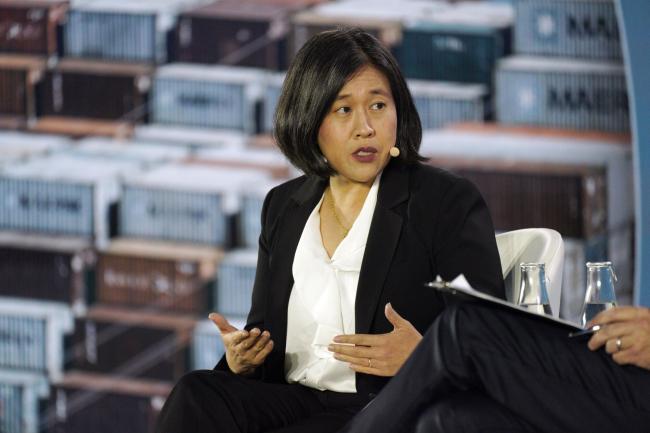(Bloomberg) -- President Joe Biden’s trade chief said the US is working with allies to counter unfair competition from China, seeking to create new agreements that bolster American supply chains and address longstanding vulnerabilities.
The Biden administration, according to US Trade Representative Katherine Tai, is adopting a trade strategy that addresses problems that the US and its partners in the past failed to anticipate, such as China’s rise and its dominance of many parts of the global economy.
One example is the Global Arrangement on Sustainable Steel and Aluminum that the US is negotiating with the European Union. It addresses China’s massive state subsidies, which the US has long said give Beijing an unfair advantage and cause global overproduction of the metals, reducing prices for American manufacturers.
Another example is the Indo-Pacific Economic Framework that the US is negotiating with 13 nations in Asia and recent critical minerals deal with Japan.
“That phenomenon of ‘China Inc.’ and the convergence between the state and the economy is something that we continue, and our systems continue, to grapple with,” Tai told reporters on Tuesday. The US is “working with partners to ensure that we have partnerships, and that it’s not just us alone taking on the PRC model,” she said, referring to the People’s Republic of China.
The world’s two largest economies and geopolitical rivals have clashed over everything from Taiwan to the coronavirus pandemic to high-tech semiconductors to the alleged spy balloon that the US shot down in February, as well as Russia’s invasion of Ukraine.
Tai remarks offered a preview of a speech that she’s scheduled to deliver on Wednesday at American University in Washington. She plans to say that US policy must “adapt to the realities of today’s global economy,” and that industrial policy and trade policy “must work hand in hand,” according to excerpts of the address prepared for delivery.
The Biden administration also is trying to ensure sure that trade benefits a greater diversity of people, including women entrepreneurs and minority-owned small businesses, Tai will say.
The speech comes after Congressional hearings last month where many Republican lawmakers and a few Democrats faulted the administration for not negotiating new free-trade agreements or having a sufficiently ambitious trade agenda.
Tai said then that tariff-lowering agreements have in some ways made the American economy vulnerable, and the Biden administration wants to address the problem with a fresh approach.
In the speech, Tai plans to highlight how the administration is negotiating to remove non-tariff barriers to American exports, including in the Indo-Pacific framework.
Part of the rebalancing of the relationship with Beijing is through measures like the so-called Section 301 tariffs that the Trump administration implemented over concerns about intellectual-property theft and that Biden has left in place on many imports from China, Tai said.
Inbound shipments of the affected products from the Asian nation declined to about $265 billion in 2021 from $311 billion in 2017, the year before the duties were imposed, the US International Trade Commission said in a report last month.
Another piece concerns domestic investments, such as the $52 billion Chips and Science Act intended revitalize US semiconductor manufacturing that for decades had been moving to Asia, and the Inflation Reduction Act to challenge China’s dominance in green technologies, Tai said.
“For a long time we just figured the market would take care of everything, and if it’s not on a level playing field, we’ve seen a lot of erosion,” Tai said. “We’ve got to take new, more active, bolder measures to invest in ourselves.”
©2023 Bloomberg L.P.

